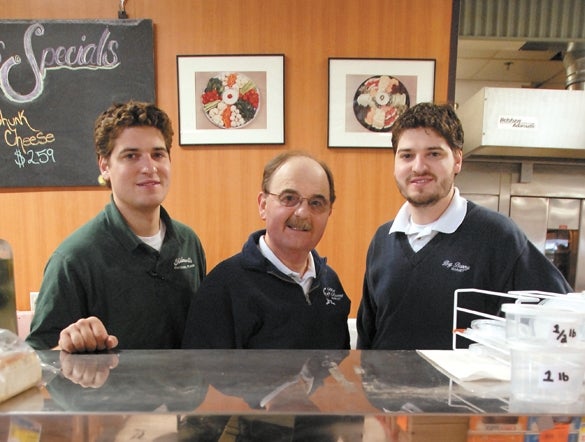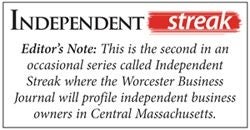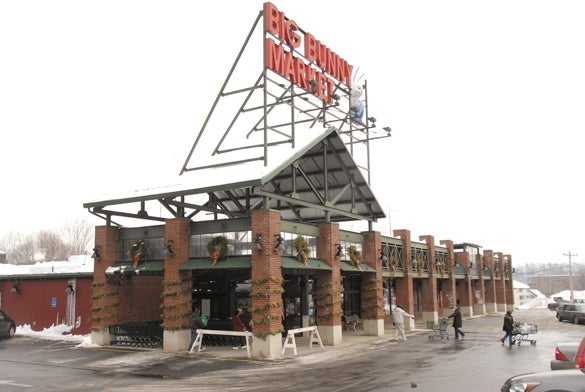Southbridge's Big Bunny defends its niche
After recent reports of numerous roof collapses caused by heavy snow and ice, employees at Big Bunny supermarket in Southbridge were up on the roof this month shoveling.
Pete Cournoyer, president of the nearly 60-year-old, family-owned company, was right up there with them. He may have the top position at Big Bunny, but “it means nothing,” Cournoyer insists.
“They know that I’ll get down and dirty when they’ve got to get down and dirty,” Cournoyer said. “These are the things that make this work.”
At Big Bunny, which has more than 100 employees, corporate competitors are just minutes away. Big Y Supermarket is on the opposite side of town. A Shaw’s supermarket and a Super Stop & Shop are in neighboring Sturbridge, four minutes and nine minutes away, respectively.
So at the 30,000-square-foot supermarket named after Bugs Bunny, everything from roles and responsibilities to operational systems — or lack thereof, Cournoyer jokes — are different from what you would find at one of the big chains.
“You wear a lot of hats,” Cournoyer said. “You do what needs to be done.”
Flexible Edge
Cournoyer gives his department managers the authority to make their own decisions about buying a few loose pallets of a particular item from a vendor at a discounted price. They don’t have to check it with him or anyone else first. The department manager will then “in-store” that item, putting it on sale but not advertising it because of limited supplies.
It may amount to a small profit, but customers notice, said supermarket analyst David Livingston of Milwaukee-based DLJ Research, who has done market research in Massachusetts.
It is these types of “instantaneous decisions” where an independent supermarket can push its edge, Livingston said. It’s about maneuverability.
“What a good independent does is they empower their people to make decisions on their own,” Livingston said. “A really smart independent is able to identify these situations, make a decision and capitalize on it.”
Many of the buying methods and business traditions used by the late Henry Palmerino, Cournoyer’s father-in-law and co-founder of the store in the early 1950s, remain today.
For one, Big Bunny is still known for its meat. Walk into the store and the first thing a customer sees is the meat department, an unusual layout for most supermarkets. And then the customer, unless he has already checked the weekly circular, sees the sales — fresh pork bone-in chops or roast at $1.69 per pound. Chicken leg quarters at 69 cents per pound. Tenderloin roast at $4.99 per pound.
“Meat is the focus of the store,” Cournoyer said.
In the 1950s, Palmerino knew that families based their shopping trips around the meat purchase. That may not be true as much these days, Cournoyer said, but Big Bunny has maintained the prominent location of its meat department.
Of course, Big Bunny can’t compete with other supermarkets on every item in the store, nor can it offer as many brands overall, but good deals on meat draw in customers, who will likely purchase the rest of the goods on their shopping list during that visit.
Livingston, the supermarket analyst, said that featuring a “marquee department” is something independent supermarkets can do to stand out in their market.
“The independent has to find compelling reasons to get people in their store,” Livingston said.
And then there are the buying methods, which can be vastly different when comparing an independent and a corporate store, he said.
Driving A Bargain
This can be seen at Big Bunny in the way the store gets its fruits and vegetables. They don’t just pick up the phone and talk to a supplier.
Three times a week, Cournoyer or his son Justin, 30, leaves town at 3:30 a.m. headed for a market in Chelsea, where they work for about six hours hand-selecting perishables and haggling prices with approximately 30 vendors.
Those trips not only allow the store to hand pick the best fruits and vegetables available that day, but to develop personal relationships with vendors that translate into attractive sales for store customers.
Cournoyer said he is proud that Big Bunny continues to compete, but said he only has so much time to keep track of the store’s competitors.
Sometimes he will hear from customers about one store having a better deal. But one of the primary methods he uses to keep tabs on the others is by studying their weekly circulars advertising current or upcoming sales.
If he sees that Shaw’s is advertising competitive prices on Fritos, Cournoyer will call his supplier and demand the same deal.
“I kind of take advantage of the market research they’ve done,” he said of other supermarkets.
New Ventures
For years, Cournoyer and his brothers-in-law Mark Palmerino and recently retired Larry Gaine looked for the right opportunity for Big Bunny to open a second store.
Big Bunny once had a successful second supermarket in Stafford Springs, Conn., but Henry Palmerino and his two brothers sold it to Big Y in 1984 when the two brothers decided to retire.
The family was looking for something a bit smaller, in their advertising area and within their ability to operate.
They found what they were looking for in a 5,000-square-foot building on Main Street in the Fiskdale section of Sturbridge.
They bought the building, and Micknuck’s Fresh Marketplace opened in 2001.
It was a rough start. In fact, it was a rough five years, as Cournoyer and the others struggled with identity of the store and its customer base.
Cournoyer’s son Justin took over management of the store several years ago, and by his father’s account, has “totally turned it around” by reducing overhead costs and working long hours.
The store is now profitable, Cournoyer reported.
When his brother-in-law Larry Gaines retired in December, Cournoyer admits he began thinking about retiring himself.
“Retirement is on my radar now,” he said.
But he’s not leaving yet. Cournoyer, 61, still feels that he makes valuable contributions to Big Bunny.
But he is confident that when he does decide to leave, his sons Justin and Jonathan, who is currently the grocery manager, will be more than capable of running Big Bunny in a successful way.












0 Comments